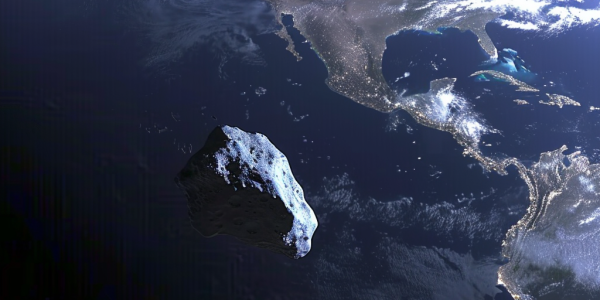Experts Discuss Hypothetical Asteroid Threat in Table-Top Simulation
A table-top simulation involving asteroid experts, NASA workers, and international partners highlighted the potential threat of a massive asteroid with a 72% chance of colliding with Earth in 14 years. With thousands of ‘near-Earth objects’ still unidentified, the exercise emphasized the need for ongoing preparedness and vigilance to protect the planet from catastrophic impacts.
Earth’s Inner Core Slowing Down Rotation, Impacting Day Length
Recent study shows Earth’s inner core is slowing down its rotation, potentially affecting the length of days. The solid mass of iron and nickel over 3,000 miles below the surface is rotating at a reduced speed, with implications for the planet’s overall rotation. Despite projected minuscule changes in day length, ongoing research sheds light on Earth’s intricate geophysical processes.
NASA Warns of Plane-Sized Asteroid Approaching Earth in 2024
NASA warns of a 98-foot plane-sized asteroid, 2024 LB4, on a trajectory towards Earth, set to make a close approach on June 16, 2024. Despite its size and proximity, NASA assures no immediate threat. Continuous monitoring by the Center for Near-Earth Object Studies highlights the importance of planetary defense efforts and asteroid research. NASA’s Jet Propulsion Laboratory tracks asteroids like 2024 LB4 using advanced telescopes and radar systems to assess potential risks. The close approach in June 2024 underscores the need for ongoing vigilance in monitoring asteroids and ensuring Earth’s safety.
Comet C/2023 A3: The ‘Comet of the Century’ Set to Dazzle Astronomy Enthusiasts
Astronomy enthusiasts are eagerly anticipating the upcoming visit of the ‘comet of the century,’ Comet C/2023 A3. Renowned Canadian astronomer David H. Levy has labeled it as such due to its expected spectacular cometary tail. The comet’s brightness and visibility from the Northern Hemisphere make it a rare astronomical event not to be missed. Track its location with the Sky Tonight app for a seamless viewing experience.
The Fascinating Diversity of Alien Life: Beyond the Conventional Depictions
The search for alien life is a captivating quest that has intrigued humanity for ages. Contrary to popular depictions, experts suggest that aliens, if they exist, may have diverse physiologies shaped by unique environmental conditions. From flying creatures on planets with dense atmospheres to subterranean organisms thriving underground, the potential for extraterrestrial life is far more complex and intriguing than seen in movies. Research even suggests that aliens exposed to extreme UV radiation could glow in vibrant hues as a protective adaptation. The exploration of distant worlds and their inhabitants remains a fascinating frontier for scientific inquiry.
Discovery of Living Stromatolites in Saudi Arabia
Exciting new discoveries in paleobiology reveal the presence of stromatolites, the oldest geological record of life, in Saudi Arabia. These ancient structures, formed by algae carpets, played a crucial role in Earth’s history by contributing to the Great Oxygenation Event. The recent discovery of living stromatolites on Sheybarah Island has sparked excitement in the scientific community, shedding light on the origins of life on our planet.
Atmosphere Discovered on Rocky Exoplanet 55 Cancri e
Recent breakthroughs in astronomy have unveiled a fascinating discovery – an atmosphere surrounding a rocky exoplanet, 55 Cancri e, shedding light on the intricate interplay between its molten surface and evolving atmosphere. Utilizing the James Webb Space Telescope, scientists identified a thick atmosphere possibly containing carbon monoxide and carbon dioxide, offering valuable insights into the planet’s composition and behavior. This groundbreaking research expands our understanding of exoplanets and planetary atmospheres, paving the way for further exploration of the vast universe beyond our solar system.
Ozone Layer Faces Renewed Crisis Despite Progress
The ozone layer, crucial for protecting life on Earth from harmful UV rays, is once again facing a crisis due to human-made chemicals. Despite progress in reducing ozone-depleting substances, a persistent hole over Antarctica poses a threat to plant and animal life. The international community must remain vigilant in curbing harmful emissions to safeguard our planet.
The Dark Forest Theory: Are Aliens Hiding from Us?
Explore the Dark Forest theory, which suggests that advanced alien civilizations may be intentionally hiding from us to avoid potential conflicts. While intriguing, experts caution against viewing this as the definitive solution to the Fermi paradox, highlighting the diversity of potential extraterrestrial behaviors. The quest for understanding extraterrestrial life remains a compelling enigma.
Fascinating Prediction of Earth’s Future Continent Formation
Discover a fascinating prediction of Earth’s future continents in a captivating video released by AGU. Explore the concept of continental drift and the potential reformation of a supercontinent over 250 million years. Learn about the historical significance of Pangea and the role of plate tectonics in shaping Earth’s land masses. Dive into the animated projection of how Earth’s continents could unite into a colossal supercontinent in the distant future.










